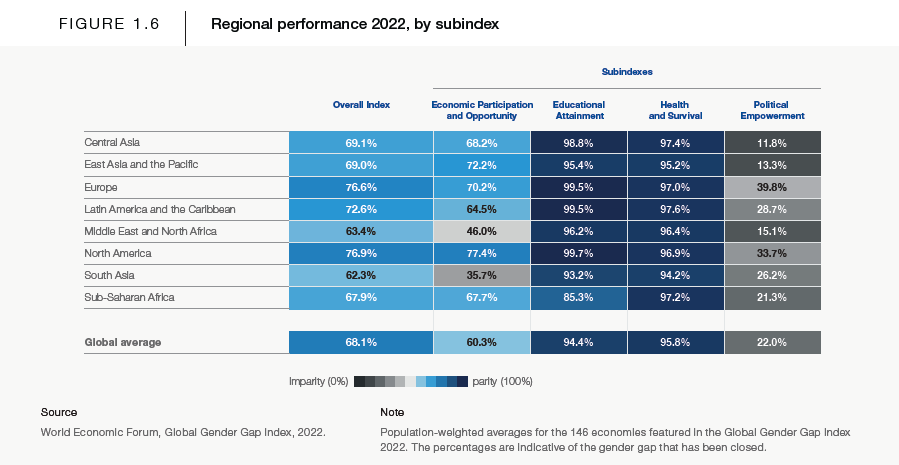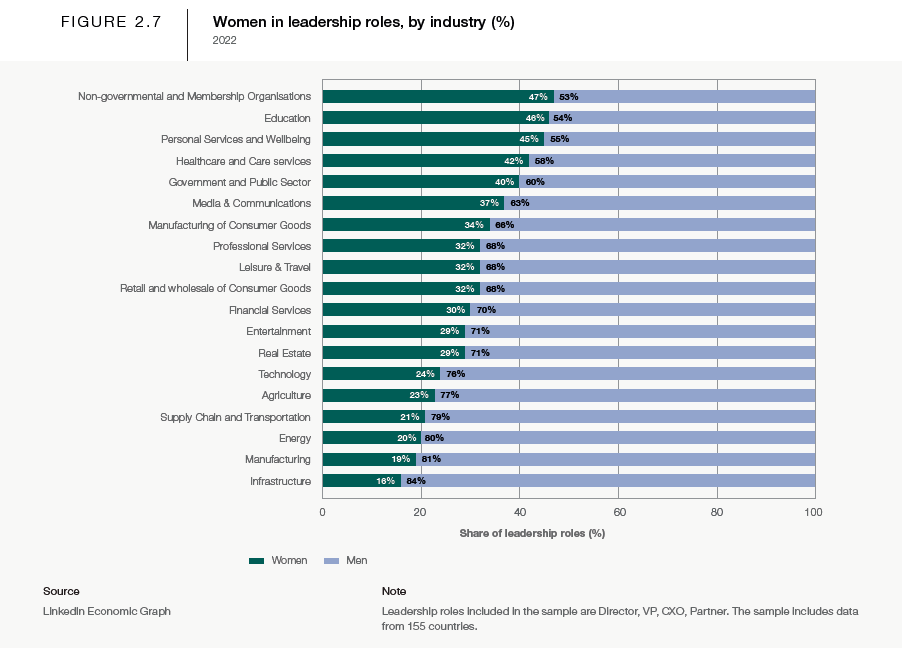"In 2022, the global gender gap has been closed by 68.1%. At the current rate of progress, it will take 132 years to reach full parity."
This is from Global Gender Gap Report 2022 by the World Economic Forum. Depressing, isn't it? The good news is that there is work that can be done, and there are many people who are passionate enough about it to roll up their sleeves and jump right in. Being one of them, I'm fired up. This type of statistic is absolutely depressing and upsetting. There is no denying it. But at the same time, it really gets me going. It's like oxygen to the already active fire.
Gender equality is a fundamental human right and a necessary condition for a just and equitable society. When gender inequality exists, it harms not only women but also everyone else. But let's forget about human rights, feminism, women's rights, gender equity, and any other big words and concepts like these for a moment. Instead, let’s think about the people around us. The people we deeply care about and love - our daughters, mothers, grandmothers, sisters, nieces, aunts, cousins, and friends. Think about them - their dreams and goals, their smiles, their full hearts. And then look at the statistic like the one I started this blog with once again. Isn’t your inner fire being activated? Wanting to do something to change the trend? If not, here are some more sobering statistics:
- Prior to COVID-19, the gender gap was set to close within 100 years. During the pandemic, a generational loss occurred and with the current rate of progress, it will take 132 years.

(Image source: Global Gender Gap Report 2022, the World Economic Forum)-
- North America, the gender gap is close at 99.7% in terms of educational attainment. But only 77.4% for economic participation and opportunity, and 33.7% for political empowerment. It is great that women have an almost equal opportunity for education but with the same education under their belt, they don’t have equal opportunities post graduation.
-
- North America is the most advanced region in terms of closing the gender gap with the population weighted average score of 76.9%. With the current progress rate, it will take 59 years to close the gender gap.
-
- Only 37% of leadership roles is held by women. The industry that has the most gender parity in leadership is NGO. Forty-seven percent of the leaders there are women. In the technology sector, where we operate, has only 24% of the leadership roles held by women. The worst industry in terms of the gender parity in leadership is in infrastructure where only 16% of the roles are held by women.
- Only 37% of leadership roles is held by women. The industry that has the most gender parity in leadership is NGO. Forty-seven percent of the leaders there are women. In the technology sector, where we operate, has only 24% of the leadership roles held by women. The worst industry in terms of the gender parity in leadership is in infrastructure where only 16% of the roles are held by women.

-
(Image source: Global Gender Gap Report 2022, the World Economic Forum)
-
I am still having difficulty understanding the full scope, depth, and complexity of gender inequality no matter how much I educate myself on the matter.
-
Gender inequality exists because of a combination of social, cultural, economic, and political factors that create and reinforce gender-based disparities. Throughout history, societies have assigned different roles, responsibilities, and expectations to people based on their gender (that they were born with), leading to unequal access to resources, opportunities, and power.
-
Gender stereotypes, which are deeply ingrained beliefs and attitudes about the roles, behaviors, and abilities, can limit the aspirations and opportunities of individuals and lead to discrimination and bias in decisions such as hiring, promotion, and pay. This has led to many consequences including women being concentrated in low-paying, low-status jobs and overrepresented in the informal economy.
-
And there is systemic gender discrimination, which can occur in education, employment, and politics, and in other areas. Discrimination against women can take many forms, such as unequal pay, limited access to education and training, and exclusion from leadership roles. When women are not empowered to be in or excluded from leadership roles, organizational policies and practices continue to be shaped in a way that does not provide equal opportunities for all genders. This has significant impact on women's career prospects and earnings potential.

-
Gender inequality in the workplace and elsewhere is definitely a complex matter caused by a numerous set of factors, including societal attitudes and beliefs, organizational policies and practices, and individual biases and stereotypes. Addressing these factors requires a comprehensive approach that involves challenging gender stereotypes, promoting inclusive and equitable policies and practices, and increasing women's representation in leadership positions.
-
Given the complexity, it really is daunting. It is best to break things down to digestible and reasonable steps and set achievable goals. In that spirit and in celebrating International Women's Day 2023, we at ProServeIT are undertaking two specific initiatives.
-
We are co-hosting a clothing drive with Microsoft to support a nonprofit organization, Dress for Success. We are collecting clothing items to donate to Dress for Success for them to help women in transition to gain economic independence. At our clothing drive event, we will have speakers from different stages of their career journey, from junior employees to mid-level managers to senior executives, to empower as many women as possible and share inspiring stories with each other. We designed the event in a specific way to include as many speakers as possible to give as many women as possible the opportunity to step onto a stage and share stories. We also carefully chose a woman-led business that is committed to giving back to supply and assemble our gift bags for the event attendees. The keynote and panel discussions are available virtually to everyone who is interested. I encourage you to tune in and share it with anyone you think would benefit from it. Register here.

-
For the second initiative, we are launching a Women's Group called #EmpowerWomen. In the technology sector, women represent a small portion of the population. The ratio becomes even more skewed at the top of the organization chart. Being underrepresented can limit the ability to advocate for policies that promote equity and inclusion. This lack of representation can also limit the availability of role models and mentors who can support their career development. Being aware of this, we are launching a group to create additional support, networking, mentorship, and empowerment. If you have tips and suggestions, I'm all ears. I can be reached via LinkedIn.
-
If it will take 132 years to reach full gender parity, that means we are not going to witness it in our lifetime, nor will our children. This turns my stomach upside down. So I am taking steps. No matter how small they seem, I can take one step at a time believing and knowing that every action counts. I warmly invite you to join the movement in a way that suits you, that moves your heart.
Resources:
- International Women's Day official website
- Global Gender Gap Report 2022 by the World Economic Forum
- United Nations' official website stating Gender Equity issues
- Women in the Workplace 2022 report by McKinsey and LeanIn
Tags:

March 07, 2023
Comments